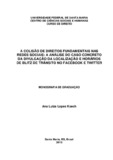| dc.contributor.advisor | Oliveira, Rafael Santos de | |
| dc.creator | Koech, Ana Luiza Lopes | |
| dc.date.accessioned | 2017-08-21T16:45:29Z | |
| dc.date.available | 2017-08-21T16:45:29Z | |
| dc.date.issued | 2013-12-12 | |
| dc.date.submitted | 2013 | |
| dc.identifier.uri | http://repositorio.ufsm.br/handle/1/11411 | |
| dc.description | Trabalho de conclusão de curso (graduação) - Universidade Federal de Santa Maria, Centro de Ciências Sociais e Humanas, Curso de Direito, RS, 2013. | por |
| dc.description.abstract | The emergence of the information society, due to the development and
popularization of new technologies of information and communication, provided
significant changes in the interactions between individuals of world society as well as
Brazilian. Thus, common conflicts that occur in the non-virtual sphere shall also occur
in the virtual context, because it is basically an extension of real life. Among these
conflicts, stand out on the collision between fundamental rights. In the virtual realm, it
is quite common, especially, the collision between the freedom of speech and other
rights equally protected by the Federal Constitution, like the rights of personality. In
the present study, it will be analyzed the case of disclosure of the location and timing
of traffic blitz on social networking websites, deliberating about the possible conflict
between the fundamental right to freedom of speech and the public security.
Therefore, initially, it was presented the rise and evolution of the information society,
due to the advent of the Internet and the popularization of the use of social
networking sites. Next to this, it was carried out a theoretical construction on
fundamental rights and collisions between these rights, approaching, also, ways of
settling this kind of conflict. Ultimately, it was performed the analysis of the disclosure
of traffic blitz on Facebook and Twitter, questioning whether there is or not the
conflict between the right to freedom of speech and the right to public security and
how it could be solved, analyzing which right must prevail over the other in that
specific situation. | eng |
| dc.language | por | por |
| dc.publisher | Universidade Federal de Santa Maria | por |
| dc.rights | Acesso Aberto | por |
| dc.subject | Internet | por |
| dc.subject | Information society | eng |
| dc.subject | Internet | por |
| dc.subject | Sociedade informacional | por |
| dc.subject | Conflito entre direitos fundamentais | por |
| dc.subject | Divulgação de blitz nas páginas Facebook e Twitter | por |
| dc.subject | Liberdade de expressão | por |
| dc.subject | Segurança pública | por |
| dc.subject | Conflict between fundamental rights | eng |
| dc.subject | Disclosure of traffic blitz on Facebook and Twitter pages | eng |
| dc.subject | Freedom of speech | eng |
| dc.subject | Public security | eng |
| dc.title | A colisão de direitos fundamentais nas redes sociais: a análise do caso concreto da divulgação da localização e horários de blitz de trânsito no Facebook e Twitter | por |
| dc.title.alternative | The conflict between fundamental rights in social networks: the analysis of the disclosure of location and hours of traffic blitz on Facebook and Twitter | eng |
| dc.type | Trabalho de Conclusão de Curso de Graduação | por |
| dc.degree.local | Santa Maria, RS, Brasil | por |
| dc.degree.graduation | Direito | por |
| dc.description.resumo | A emergência da sociedade informacional, em decorrência do desenvolvimento e
popularização das novas tecnologias de informação e comunicação, proporcionou
mudanças significativas nas interações entre os indivíduos da sociedade mundial e,
também, brasileira. Assim, conflitos comuns ocorridos na esfera não virtual,
passaram a ocorrer também no âmbito virtual, por tratar-se, basicamente, de uma
extensão da vida real. Entre esses conflitos, destacam-se os relativos à colisão de
direitos fundamentais. No âmbito virtual, é bastante comum, principalmente, a
colisão do direito à liberdade de expressão com outros igualmente protegidos pela
Constituição Federal, como os direitos de personalidade. No presente estudo, será
analisado o caso da divulgação da localização e horário das blitz de trânsito nos
sites de redes sociais, ponderando-se se ocorre o conflito entre o direito fundamental
à liberdade de expressão e o direito fundamental à segurança pública. Assim,
inicialmente, apresentou-se o surgimento e a evolução da sociedade informacional,
em decorrência do advento da Internet e a popularização do uso dos sites de redes
sociais. Após, foi realizada uma construção teórica acerca dos direitos fundamentais
e das colisões entre esses direitos, analisando-se formas de resolução dos conflitos.
Por fim, realizou-se a análise do caso concreto da divulgação das blitz de trânsito no
Facebook e no Twitter, questionando-se sobre a existência do conflito entre o direito
à liberdade de expressão e o direito à segurança pública e como se pode resolvê-lo,
avaliando qual direito deve prevalecer nessa situação específica. | por |
| dc.publisher.country | Brasil | por |
| dc.publisher.initials | UFSM | por |
| dc.subject.cnpq | CNPQ::CIENCIAS SOCIAIS APLICADAS::DIREITO | por |
| dc.publisher.unidade | Centro de Ciências Sociais e Humanas | por |


